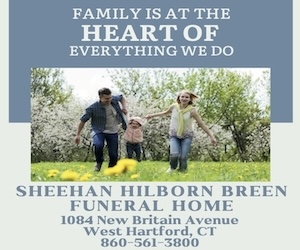 Interfaith relations during times of Conflict
Interfaith relations during times of Conflict
By Cindy Mindell
When the Israeli-Palestinian conflict heats up, like it did over the summer, it’s difficult for the average concerned citizen to remain neutral and unemotional. People following the news or hearing from family in the region move through their days feeling anxious and powerless.
But all along, in times of conflict and calm, there are groups throughout the state working to strengthen relations between clergy and laypeople of various faiths. And in their prayer meetings, holiday celebrations, conversation groups, and panel discussions lies a key to weathering the unpredictability of geopolitics.
These interfaith and intergroup efforts can be found in various sectors of society. In the organized Jewish community under the umbrella of the Jewish Federations of Greater Hartford and Greater New Haven – in the form of Jewish Community Relations Councils (JCRC) – and in AJC Westchester/Fairfield County Regional Office Interreligious & Intergroup Relations Committee. The non-profit Greater Hartford-based Connecticut Council for Interreligious Understanding and all-volunteer Interfaith Council of Southwestern Connecticut and Greenwich Fellowship of Clergy are home-grown initiatives organized and maintained by local clergy. Many houses of worship in a given community organize joint programs to learn about one another’s traditions and holidays.
The watchword of any successful interfaith group is “relationships.” And any seasoned participant in this kind of interaction knows that you have to commit to the long haul in order to see the group through events like this summer’s conflict in Gaza.
For starters, “In an age when extremism seems to be on the rise, we can hold the center by standing together,” says Rev. Kate Heichler, pastor of Church of Christ the Healer in Stamford and executive director of the Interfaith Council of Southwestern Connecticut. “One of the ways that we can be ready to have difficult conversations is having them on an ongoing basis, when it’s not ‘hot.’”
In relatively peaceful times, the Council hosts events like “My Neighbor’s Faith,” a panel discussion with local Jewish, Christian, and Muslim clergy that introduces audience members to faith traditions that are not their own.
Then, when a crisis arises, the Council has a base of clergy and lay participants who can come together in prayer and discussion. “The most effective thing is not to stage a dialogue but to bring people together to stand on whatever common ground we can find,” Heichler says.
When the Israel-Hamas conflict began in July and began to heat up, Heichler was approached by several cantors who suggested holding a communal service for peace.
“These were people who felt hopeless in the face of the crisis, and were also not totally impartial on the subject,” Heichler says. “This is the kind of time when the community has to come together.”
And sometimes you do.
Take the Presbyterian Church (U.S.A.), which announced in January that its June General Assembly would include a referendum on divesting from U.S. companies that do business with Israel.
Instead of wringing hands, the chairs of the Jewish Community Relations Councils (JCRC) of Greater Hartford and Greater New Haven called on their respective colleagues in the local Presbyterian church.
JCRC of Greater New Haven, chaired by Rabbi Joshua Ratner, reached out to the Connecticut delegates and organized a conversation with local rabbis like Herbert Brockman of Congregation Mishkan Israel in Hamden, who already had relationships with the Presbyterian community. The Jewish participants in the dialogue first listened to what the Presbyterians knew about Israel and asked what they wanted to learn more about.
The group met several times before the general assembly. “It wasn’t a lobbying effort but rather a relationship-building effort,” says Ratner. “We listened to each other’s stories and learned what they cared about and what concerned them. It made for the creation of an important group that hadn’t really existed in that way before, and we were able to inform their awareness and broaden their views at the time of the vote.”
Ratner says that he doesn’t know what the delegates may have shared with their colleagues at the general assembly or how they voted on the divestment referendum. “But I think that having taken that effort ahead of time to cultivate and develop those relationships certainly had some impact,” he says. “And even though we’re not happy with how the vote went, we will continue to meet with them to see where we go next.”
This is the crux of interfaith endeavors. “Relationship-building is geared toward developing the relationships themselves and not because of a specific vote or program,” Ratner says. “We will continue to try to make sure that the Presbytery of Southern New England and the JCRC work toward a constructive response to the Israeli-Palestinian conflict, rather than more hostility, disengagement, and BDS [boycott, divestment, and sanctions].”

Rabbi Mitchell Hurvitz of Temple Sholom in Greenwich (left) and Rev’d. Dr. James B. Lemler of the neighboring Christ Church, on an interfaith trip to Israel in 2012.
Think of interfaith relations as what happens in a family, says Rabbi Mitchell Hurvitz of Temple Sholom in Greenwich, a 20-year veteran of the local interfaith scene.
“Families aren’t ‘Kumbaya,’” he says. “The issue is, how do you effectively address your relationship when being confronted by dialectics? Just as you would navigate in a family situation, the same sort of rules apply among people of different faiths. What’s the prioritization – is your goal an objective or a relationship? The mistake people make is putting the focus on an objective and without a quality relationship, you have a much harder time addressing the objective.”
Since joining the Temple Sholom clergy in 1995, Hurvitz has been steeped in interfaith work, from assuming leadership positions in the Greenwich Fellowship of Clergy and Interfaith Council of Southwestern Connecticut, to creating the Sholom Center with the the Rev’d. Dr. James B. Lemler of the adjacent Christ Church.
Hurvitz attended Lemler’s installation in 2007, where keynote speaker Bishop Desmond Tutu – who is known for his anti-Israel, anti-Jewish, stance – talked about an Israeli-Palestinian conflict raging at the time. “He said, ‘We offer our prayers on behalf of the Palestinians being confronted by violence’ but said nothing in regards to Israel,” Hurvitz recalled. “Rev. Lemler stood up, looked at me, and said, ‘And of course we offer our prayers to the Israelis who are suffering as well.’ You care about your family and friends, and their feelings matter. When you have a close relationship, you end up being more effective on an issue that needs to be addressed.”
Interfaith relations work both on an individual level and on a group level, Hurvitz says, and the strongest groups are those that have cultivated individual relationships. For example, while Israel is not on the “top 10” list of most of Hurvitz’s non-Jewish colleagues, when there is a crisis in Israel, they think about it differently because of their relationship with the rabbi.
Likewise, Hurvitz will get involved in a cause important to a colleague, even if it isn’t high among his priorities.
“A minister in town is very involved in fighting human trafficking and asked to meet with me, and while that might not have been the thing I would spend time with on my own, my friend cared deeply so I became involved,” he says. “I have friendships with priests and ministers not to cultivate alliances, but because it’s a way of living life with people who have a shared energy and mission with my own.”
One of the most effective projects of the JCRC of Greater Hartford is known as the “Brunch Bunch,” a group of Jewish and Muslim couples who meet in one another’s homes every few weeks to eat and socialize. Many of the participants met at a 2012 JCRC event, when their teenagers attended a screening together at the Hartford Jewish Film Festival.
Most of the Muslims in the Brunch Bunch are Pakistani and came to the group with little knowledge about the Middle East, says JCRC chair Brandwein, who is also a participant. But schmoozing over coffee proved to be fertile ground for addressing serious issues later on.
“For two years we met and did not broach the subject of Israel and the Middle East, but talked about family, food, culture, and lifecycle,” Brandwein recalls. The group shared a Passover seder at Brandwein’s house and an iftar (break-fast during Ramadan) at Beth Israel Synagogue in West Hartford.
Then, when Israel and Gaza exploded into violence, local Muslim community leader Saud Anwar called Brandwein and JCRC director Laura Zimmerman.
“He said, ‘We are getting inundated on Facebook and Twitter and in emails with a lot of information, and we don’t know if it’s correct or not,’” says Brandwein. “‘Is our group comfortable enough to talk about it yet?’”
It was. Anwar invited 30 Jews and Muslims to his home for iftar and for two hours before sundown, they talked about the Middle East.
“It was only because we had developed friendships over the two-plus-year period that we were even able to broach the subject, and it was done with respect,” says Brandwein. “The Muslims asked a lot of history questions about Zionism and the formation of the State of Israel. They wanted to hear the Jews’ perspective and I think they also especially wanted to hear us say that we felt terribly for the innocent victims on both sides because most of what they were hearing was from the Palestinian and Gaza side.”
To continue the conversation, JCRC arranged a half-day retreat for the Brunch Bunch at the Avon Senior Center, led by professional facilitators, one Jewish and one Muslim.
The result of such conversation is an increased openness to the “other.”
“For Muslims, the Gaza conflict led to hearing the narrative of how the women and children and civilians were dying in the process and that was painful process for anyone,” says Saud Anwar, a Brunch Bunch participant who has been involved in interfaith dialog since immigrating to the area from Pakistan in 1991. “At the same time, we have to understand the fear and pain that people in Israel were facing and living with during that episode and recognize the individuals who died in that process.”
The key to these conversations is to include participants who have mutual respect for one another, says Rabbi Joshua Hammerman of Temple Beth El in Stamford, long active in the Interfaith Council of Southwestern Connecticut. “You have to be willing to listen instead of shouting talking points at each other. If you’re willing to listen and acknowledge that there is truth on all sides, it can be productive and helps open people’s eyes about the Israeli-Palestinian predicament in ways that might not otherwise have occurred.”
What participants learn is to not lump people together into groups based on bad examples, Anwar says. “As you build these relationships, you start to humanize each other and in that process, you go to the next level where you can have some of those conversations that make you uncomfortable – but less uncomfortable had you not had those conversations or relationships.”
What keeps these groups going, especially during times of crisis?
“The recipe for long term success is to understand the interfaith community as relationship-building and not event programming,” says Ratner. “You have to see it as a long term investment in getting to know individuals and hearing their stories and concerns. We have to be attuned and responsive to other faiths if we want them to be concerned and responsive to our needs.”
Comments? email cindym@jewishledger.com.








 Southern New England Jewish Ledger
Southern New England Jewish Ledger











